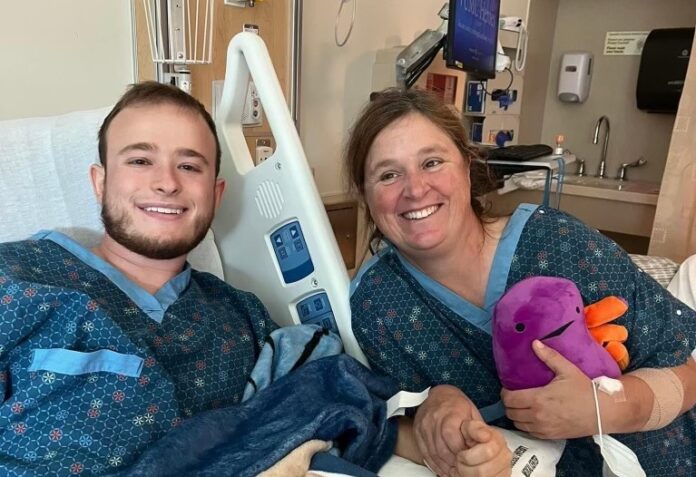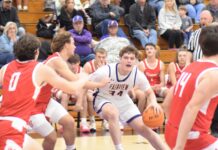HELICON, Ala. – Helicon firefighter Lael Feist recently underwent transplant surgery to donate a kidney to UAH student Alex Jones, who has Alport syndrome, a condition which causes progressive loss of kidney function. Jones has type O blood and could only receive a kidney from someone with the same blood type. He had been on the Vanderbilt Medical Center waitlist since April.
Jones had just completed his first semester as a sophomore at UAH as an Aerospace Engineering major when he found out that he needed a transplant.
“I found out after a semester. I was in stage three, they said, and I actually went through the entire semester not knowing, and then after that, I found out and continued through school,” he said. “I haven’t had a semester off since.”
Jones’ family was informed by his doctor that if they did not have a confirmed surgery appointment by Aug. 12, he would have to be put on dialysis. Earlier that same week is when they received confirmation from Feist.
Feist shared her motivation for being a living organ donor, saying, “We lost a baby 20 years ago this month, so I was looking for a way to do something with the grief. In passing, I had talked with someone back in June that was in kidney failure, and it made me think, since we lost a baby that was born without kidneys, this was a good way to give back.”
Feist began looking into kidney donation and learned of the toll that dialysis takes on a patient. Dialysis filters toxins out of the blood of people whose kidneys cannot complete the function. Patients have to undergo the process for three to four hours a few times a week.
“It a significant time commitment for the patient. It doesn’t allow them to be active. They’re tied to a dialysis center even if they want to go on vacation somewhere,” said Feist.
She registered in June on the National Kidney Registry, an organization dedicated to increasing the number of kidney transplants from living donors, with no intended recipient. She began looking at nearby donation centers and selected Vanderbilt Medical Center in Nashville.
Feist said she searched Facebook for anyone local who had donated a kidney at Vanderbilt to find more information. Then she saw the Facebook post by Phillip Jones, Alex Jones’ dad, asking the public for a donation by someone with type O blood and contacted the family.
When his family first learned of Lael’s process, Jones said, “We didn’t know who it was. So, my mom was like ‘We’ll see if this goes through. We’ll see.’ We were kind of skeptical because it was someone random on Facebook we never met. It kind of just came out of the blue and it was really an amazing shock.”
Feist participated in a two-day evaluation to determine whether the transplant would negatively affect her. After an abdomen CAT scan, an EKG, lung X-rays and blood tests, all her of results indicated she was healthy and able to proceed with the transplant.
Feist said, “It really shouldn’t affect me. They said not to take NSAID pain relievers consistently, but overall, two kidneys in a healthy adult provides four times what a human needs.”
Jones has been recovering quickly from the surgery. His doctor said he has high expectations that the new kidney will last around 30 years since Jones is so young. Jones will have to take anti-rejection medication for the rest of his life but will have the opportunity for a much more active life without the need for dialysis.
Feist shared, “I guess there were some little God signs along the way that showed that everything was right in our decisions. He’s pretty close in age to what our child’s age would have been. He has the same major as my daughter who just started college. It ended up being so meaningful for me because we lost a baby due to missing kidneys, so for me, I knew how his mom felt, and in particular wanted to prevent their heartache.”
Feist would like to raise more awareness about the need for living donors. Organs donated by living donors last twice as long as those from deceased donors. As of January 2021, 1,259 people were on the waitlist at Vanderbilt for a kidney donation: 608 joined the list and 619 were removed. Out of those, 315 received a transplant, 93 deteriorated, one transferred, one recovered, 79 died and 130 were removed for other causes. At the end of December 2021, 1,248 people were on the waitlist: 66 received a transplant from a living donor and 249 received a transplant from a deceased donor.
Through kidney-paired donation (KPD), if someone wants to donate to a family member or friend, but does not have the same blood type, they can donate through the National Kidney Registry to someone else and get a voucher for a kidney elsewhere for their family or friend. For more information, visit www.kidneyregistry.org.
Copyright 2022 Humble Roots, LLC. All Rights Reserved.



























